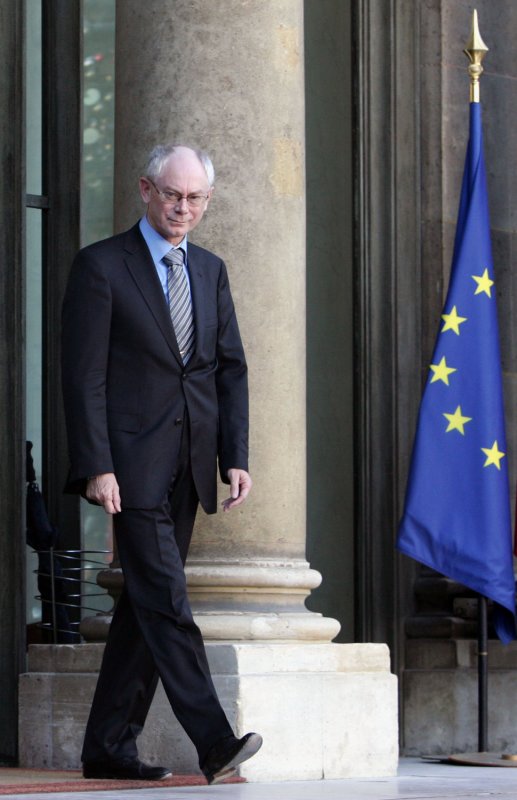EU's first president Herman Van Rompuy walks past a EU flag as he leaves the Elysee Palace, in Paris, December 04, 2008, after meeting with French President Nicolas Sarkozy. Van Rompuy embarked on a tour of European capitals after he was chosen for the newly-created post at an EU summit last month. UPI/Eco Clement |
License Photo
BRUSSELS, Dec. 17 (UPI) -- EU leaders agreed to set up a permanent safety net to bail out member states whose debt problems threaten the eurozone.
EU leaders meeting Thursday and Friday in Brussels agreed to put in place by 2013 a permanent safety mechanism to succeed the European Financial Stability Facility, a $1 trillion temporary bailout fund set up earlier this year.
To set up the mechanism, the Lisbon Treaty, the body's de facto constitution, will have to be amended, in a move that has to be signed off by each member state. Until then, the volume of the EFSF won't be increased, Luxembourg's Prime Minister Jean-Claude Juncker said.
"We stand ready to do whatever is required to ensure the financial stability of the eurozone as a whole," European Council President Herman Van Rompuy was quoted as saying Friday by the BBC.
The decision comes after Greece and Ireland needed bailouts and a few days after Spain's interest rate for government bond sales was raised because of doubts about the country's fiscal stability.
Tapping the new fund's resources "will be made subject to strict conditionality," the new text added to the Lisbon Treaty reads. The "strict conditionality" clause, demanded by Germany, means that eurozone members getting money from the fund will have to reduce debt and commit to austerity measures, observers say. As the continent's biggest economy, Germany is making the largest contributions to any bailout.
European Commission President Jose Manuel Barroso lauded the agreement, saying it meant a "big day for Europe."
"Our task now is to hold a course -- walk, not talk -- and prove those wrong who predicted the demise of our common currency," Barroso said.
Spain has insisted its economy is stable, adding that it won't need bailout money. While its public deficit is manageable and its large private banks are healthy, an array of local banks, the so-called caixas, is in trouble because the banks lent excessively during the country's real estate boom. Ratings agency Moody's Wednesday said it was reviewing Spain's credit rating with a possibility to downgrade it.
Meanwhile, Britain, Germany and France -- Europe's three largest economies -- are gearing up to call for a freeze in the EU budget until the end of the decade.
The three countries will launch a joint text on Saturday announcing their demands, the BBC reports.





